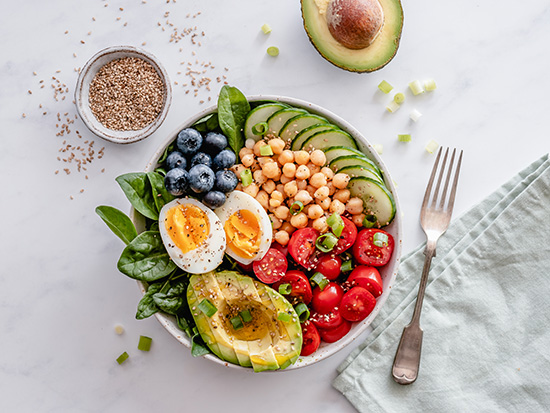Maintaining a healthy diet is important for your body’s overall health, reducing risk from many chronic noncommunicable diseases, such as diabetes, heart disease and cancer.
In honor of National Nutrition Awareness Month, Amy Warriner, M.D., director of UAB Weight Loss Medicine and professor in the University of Alabama at Birmingham Division of Endocrinology, Diabetes and Metabolism, and Lizzy Davis, Ph.D., assistant professor with the UAB Department of Nutrition Sciences, share their top five tips for maintaining a healthy diet.
Choosing the right foods
It is important to choose foods for their nutrient content most of the time. Similarly, Warriner recommends choosing food for enjoyment only some of the time.
“It is important to know what nutrients are in foods and how to work those foods into your daily diet,” Warriner said. “If you do not know how to do this, talking with a registered dietitian can be very helpful.”
Davis says food is used more than just to sustain life — it is tied to culture, feelings, community, memories and more.

Amy Warriner, M.D.,
Photography: Chris Carmichael
Some examples include fruits, vegetables, whole grains, lean meats, peas, beans and nuts.
“Typically, foods that are closer to their natural form are going to be nutrient-dense,” Davis said.
No food is bad food
There are no specific foods that you should or should not eat to be healthy. Balance is necessary, and all is OK in moderation and with balance.
“If you are eating a diet full of healthy vegetables and lean proteins, eating a treat every now and again is not harmful,” Warriner said. “Alternatively, if you are eating fast food for most meals, adding a protein shake is not going to make you healthier.”
Increase vegetable intake in your diet
Warriner says increasing the number of vegetables you eat is something most people struggle with. The recommended intake for vegetables is five to nine servings a day. Davis says roughly 9 percent of adults meet intake recommendations for vegetables.
“Try sneaking this in for breakfast and snacks, as typically these are eating times people aren’t consuming vegetables,” Davis said. “Mix a variety of vegetables in with your eggs, throw some in your hash browns, or sneak some into your muffin or pancake batter.”
Read More at UAB News.
